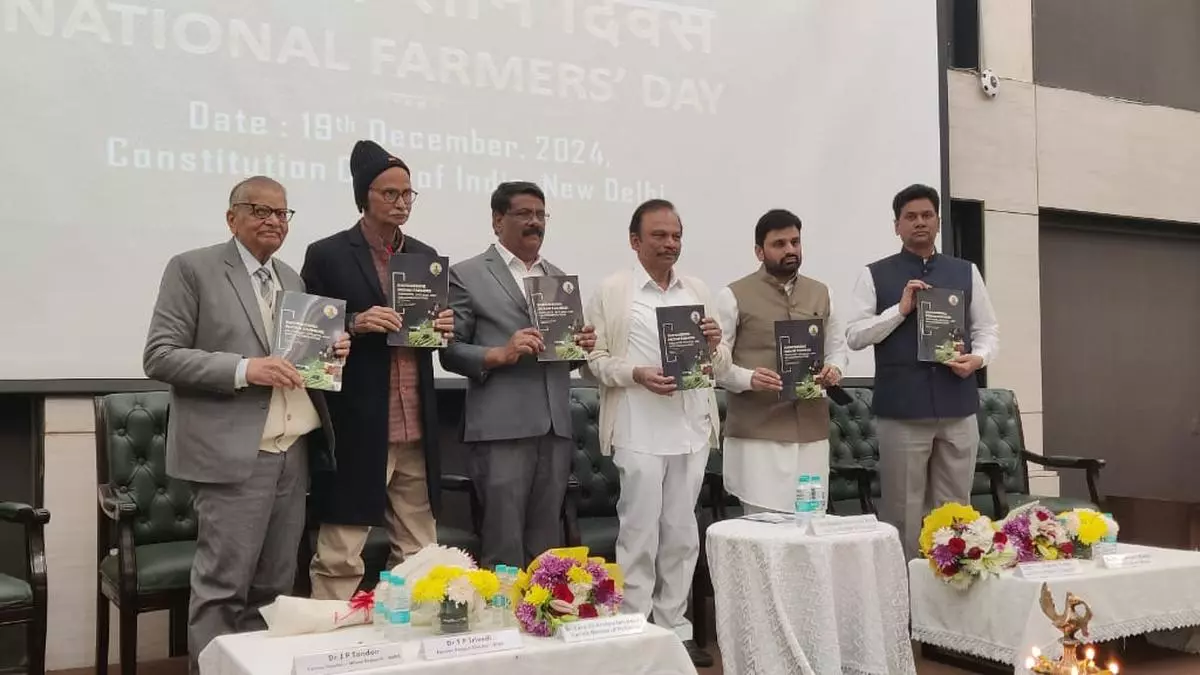FAIFA study sees 70% of Indian farmers using digital platforms for agri services by 2030
Seventy per cent of Indian farmers are expected to be using digital platforms for agricultural services, such as e-NAM and Kisan Portal by 2030, a report said.
The FAIFA Indian Agriculture Outlook 2025 revealed that digital agriculture is projected to increase agricultural productivity by 15 per cent and reduce costs by 10 per cent by 2030. Also the country’s irrigation coverage is expected to increase to 60 per cent of agricultural land by 2030, up from 50 per cent in 2025. Water harvesting and conservation efforts are projected to reduce water waste by 20 per cent and increase water efficiency by 15 per cent by 2030, the report said.
The ‘FAIFA Indian Agriculture Outlook 2025’ with the theme ‘Empowering Indian Farmers – Progress, Outlook, and Recommendations’ to mark Kisan Divas was released in Delhi recently.
The report forecasts Indian agriculture to grow at a CAGR of 5.5 per cent from 2025 to 2030, reaching a total value of ₹42 Lakh crore. Food grain production is projected to increase by 25 per cent by 2030, from the current 330 million metric tonnes, it said.
In terms of yield, wheat yields have the potential to increase by 20 per cent to 5.5 metric tonnes per hectare by 2030, while rice yields are projected to increase by 25 per cent to 4.5 metric tonnes per hectare by 2030, the FAIFA report said.
The report also emphasises on how Agristack, the Government’s initiative, a digital platform that integrates various stakeholders in the agriculture sector, has the potential to be a game-changer by improving agricultural productivity and farmer incomes. By offering a single-window access to services like soil testing, fertiliser recommendations, pest management, and market access, it enables farmers to make informed decisions, reduce transaction costs, and improve market access. It also promotes sustainable farming practices, reduces chemical usage, and supports soil health. Additionally, it strengthens agricultural governance by allowing government agencies to monitor and evaluate agricultural programs, making Agristack a transformative tool for modernising agriculture.
Javare Gowda, President, Federation of All India Farmer Associations (FAIFA) said, “The report highlights the significant progress made by Indian farmers and the agricultural sector as such over the last decade, driven by policy interventions, technological advancements, and changing market dynamics. The projections have been made basis the all-round robust and consistent growth the sector has witnessed in the last decade owing to the holistic approach of the Centre. This report projects a good prospect for the sector and also carries recommendations to ensure food security, enhance farmers’ prosperity, and sustain healthy growth”.
Murali Babu, General Secretary, Federation of All India Farmer Associations (FAIFA), said, “To sustain growth and ensure food security, the government must continue to invest in initiatives that enhance productivity, provide reasonable returns to farmers, and promote sustainable agriculture practices, the report recommends. Digitalisation offers a promising solution, empowering farmers through better decision-making tools and improved market access.”
Further, FAIFA said that India’s agricultural sector stands at a critical crossroads, requiring comprehensive reforms to ensure food security, enhance farmer livelihoods, and contribute to national economic growth. Addressing short-term, medium-term, and long-term challenges is essential for sustainable progress.
In the short term, there’s a need to strengthen e-NAM, expand irrigation coverage, enhance crop insurance, promote organic farming, and improve agricultural education. In the medium-term, there is a need to implement national agricultural market policy, develop agricultural infrastructure, encourage private sector investment, foster agricultural research and innovation, and enhance farmers’ skill development.
In the long term, to achieve 100 per cent irrigation coverage, there’s a need to implement precision agriculture, develop climate-resilient practices, promote agro-tourism, and strengthen agricultural policy and governance, FAIFA said.
Effective implementation, guided by a National Agricultural Development Council, will be crucial, supported by robust monitoring, evaluation, and stakeholder engagement. A phased, strategic approach will ensure that these recommendations lead to a resilient and prosperous agricultural sector for India, it said.
